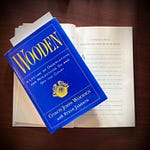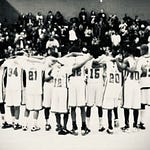Photo caption: excerpt from book, Endless Teachable Moments - An Expression on the Art and Education of Sport by Jason Aron Ronai
Dear Somewhat Heavily Recruited Prospective College Athlete,
You have an incredible decision to make. Your college decision will impact the rest of your life. This is a letter designed to support your college selection process. A warning before I begin: the coach in me is going to come out. Coaches should be truth tellers. I’m here to offer truth and perspective as you navigate both the excitement and muddy waters of the college recruiting process.
If you are an elite recruit, some aspects of this letter may not be for you. You are among the small percentage of high school athletes who can choose one of the five to ten most successful college programs in the country. Congratulations. You’re rare. But the thought process I describe is still important in your decision-making process, so keep reading.
This letter is mostly for those who are somewhat heavily recruited - those that may be able to play at the NCAA Division 1 level but have offers from all other levels.
By now, you have been partially or heavily recruited for your athletic capabilities. I trust you understand the difference between partially and heavily. For now, we will assume you are somewhat heavily recruited. You have options.
The institution, program, and coaching staff you choose will shape you and your daily education during some of the most formative years of your life. Others may tell you, “don’t worry, if you make the wrong choice, it’s all going to be okay. You can transfer.” I don’t disagree that transferring is an option, but I’m here to tell you that the wrong choice based on the wrong priorities has negative consequences. The right choice has positive consequences and saves you time. The right choice gives you a four-year educational experience through sport at the same university. I’m not here to coddle. Staying at one school is better. Transferring is hard on you and your family. There are bad choices born of wrong priorities, agendas, and misinformation every year. That’s why the transfer portal is now the top recruiting mechanism at the higher collegiate levels.
It’s incredibly important you set a foundation and a framework for the decision you must make. This is not your parents' decision. This is not a decision for your peers to make. This is not a decision for your advisor or confidant to make. This is not a decision that best suits your social media or brand. This decision is about your education, your values, and what kind of program you hope to immerse yourself in every single day. You are choosing a family, not a level. You are choosing a daily educational environment, not a brand.
Before I go further, some readers and listeners require some credibility before absorbing these words. I was somewhat heavily recruited for college basketball and baseball. I had a couple NCAA Division 1 offers, a few more Division II offers and many Division 3 and NAIA opportunities. I started on a division one basketball scholarship to St. Peter’s College (now University) in New Jersey before choosing to fully commit to baseball after my first year of college. I transferred to UNC-Asheville and had a solid baseball career. I played professional baseball for one season and have since coached college and high school baseball and basketball. I have a master’s degree in sports leadership and have dedicated my life’s work to educating people on the values of sport. I’m beginning my PhD in Global Sports Leadership this fall and wrote a book I’m very proud coming out soon called Endless Teachable Moments - An Expression on the Art and Education of Sport. I’m driven by the education of sport. Hopefully that resume will suffice.
Let’s continue. The world of college athletics is more complex than ever. Current college coaches don’t know what to make of it. I empathize with your decision. There are so many competing voices. There is too much information and not enough substance. Parents and athletes are overwhelmed. I’ll attempt to be a voice of reason and wisdom that you can choose to listen to or not.
I also want to give you the real talk so that perhaps you’ll be able to develop your own guiding principles to aid your decision-making process.
What I will write about next is a way. It’s not THE way, but it is a way. Take from it what you will. But take something, please…people get paid a lot of money to be college recruiting advisors. This is free.
What is the choice you are making?
Let’s start with what you are not choosing:
You aren’t just choosing a university.
You aren’t just choosing a brand.
You aren’t just choosing a team.
You aren’t just choosing a level.
Here is what you ARE choosing:
You are choosing a loving or toxic family.
You are choosing good or bad lifelong mentors.
You are choosing a strong or inadequate daily education through sport.
You are choosing transformative or negative leaders - your coaches.
You are choosing the development of good or bad values that impact the rest of your life.
It seems drastic. It’s the truth. Your talent will not overcome a toxic environment.
Here are eight guidelines—suggestions—to support your decision-making process:
Don’t choose the level before you determine your current values and priorities. Your current personal and family values are important. Take the time to think about this.
Write a draft of your personal values and priorities. This is a crucial step. Here’s an example: my personal core values are industriousness, toughness/poise, humility, growth-mindset, positive body-language, faith, and integrity. Is faith a top priority in your daily college experience? Is a certain academic program a top priority? What about the family atmosphere within the team? What about the size of the school, location, distance from home, student population?
Write down 2-3 additional values you hope to gain through your college athletic experience. Where do you want to grow? What values will serve you well the rest of your life? What values will serve you when sport is no longer?
Don’t choose a level before you list the universities that align to your values and priorities. Forget the level. Figure out who aligns and who doesn’t. Do the work.
Write down the list of schools that align to your values and priorities. Do the work. Be thorough in your research.
Research the coaching staffs on this list. Talk to them. Ask them questions about their personal and program values. Ask others about them. I cannot stress this enough. I believe your coaching staff is the most crucial part of the decision. The coaching staff will dictate the culture, interpersonal relationships, atmosphere, and daily schedule. The environment they create will impact your experience the most. Who they are and what they teach will become a part of you. They are integral in the daily education of your values - current and future. Coaches are difference makers. Be thorough, Choose wisely.
Ask and answer this question: of the schools on my list, will I remain at this university if I suffer a career-ending injury? It’s an athlete’s worst nightmare, but it happens. You can’t quit school. There is too much research on the long-term benefits of a college degree. You must remain in college. You must graduate. If you’ve chosen the right school and coaching staff, they’ll stick with you. They’ll help you see it through. Will you remain at any of the schools on your list if an injury were to occur?
Leave pride and ego at the door and don’t let the level trump your list. Put ego, pride, and social significance to the side. If you’ve done your due diligence on 1-7, you’ve created a list that fits you. You’ve chosen the quality and educational value of the program over all else. If you are a potential professional athlete, you WILL become a pro regardless of the level you choose if you put in the work and have great coaches. You’ll work hard and you’ll be in a great program. If your talent meets your work ethic, professional opportunities will follow.
And now a warning on level. If you are a potential D1 athlete but not elite, you must know this level is more of a business than ever before. For some D1 sports, it has sadly become more transactional than educational for some universities. Some coaches are held more accountable for winning than they are for graduating players, and most coaches don’t like that fact. If you aren’t a key contributor right away, transfers will most likely take your place. This can happen at all levels, but is much more prevalent in NCAA Division 1. Of course, there are many quality Division 1 programs and incredible, education-based coaches, but there is an unfortunate reality - it is an unpredictable, unpolished business and you have to accept it if you make that choice. Elite college athletics are a different system and beast now.
If asked my opinion on the number one priority in this decision-making process, I wouldn’t say academics. That’s too easy. Frankly, it’s the company line. Of course college graduation is a top priority as a result. But many high school seniors don’t know exactly what they want to major in. I simply think the university needs to be an academic fit based on who you are as a student and person. You should align with its values and vice versa. It should push you where you need to be pushed and it should have a set of academic programs that are enticing to you.
My number one priority? I would choose the coaching staff. They are the daily educators. They are the moment builders. They are the mentors. They are the developers of great talent. They are the curators of the experience. They are the head of the family. Their values and teaching will be the thing you talk about to your own children. Great coaches exist at all levels.
My father was a very successful college and high school basketball coach. I’ve read the drawer full of letters his players have sent to him. I know how much credit they give to him and his basketball program for the adults they are today. Coaches are not your parents, but they often impact you just as much if not more. Coaches are difference makers. They are the ones who will properly capture the teachable moments of sport, or not.
Good luck with your decision and best wishes on a successful, four to five-year educational experience through sport.
Choose wisely.
Be great and break barriers,
Jason Aron Ronai













Share this post